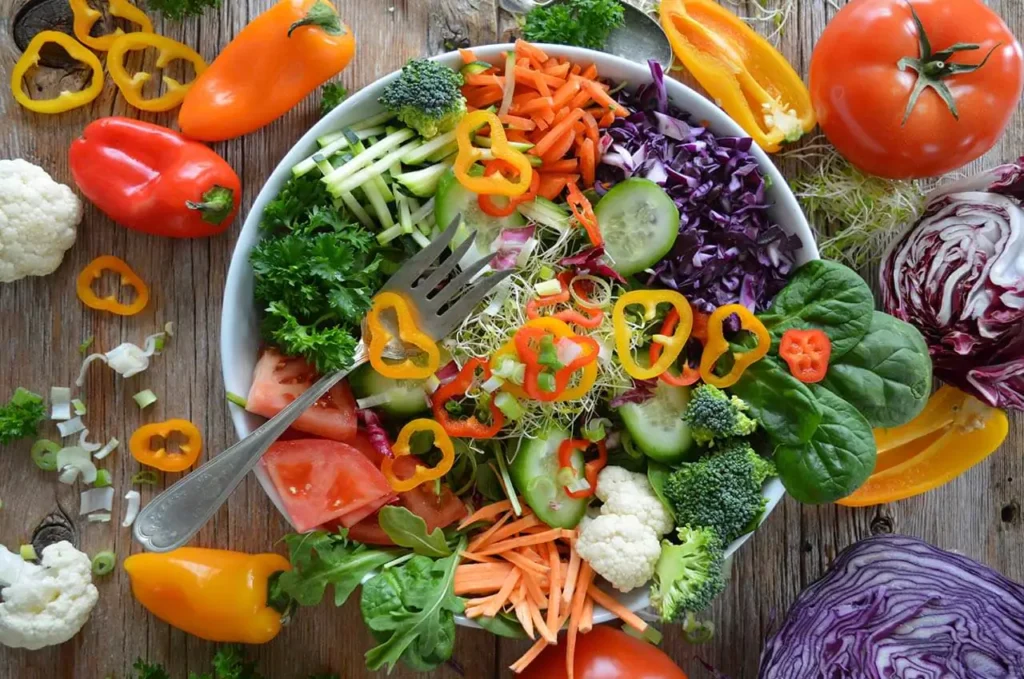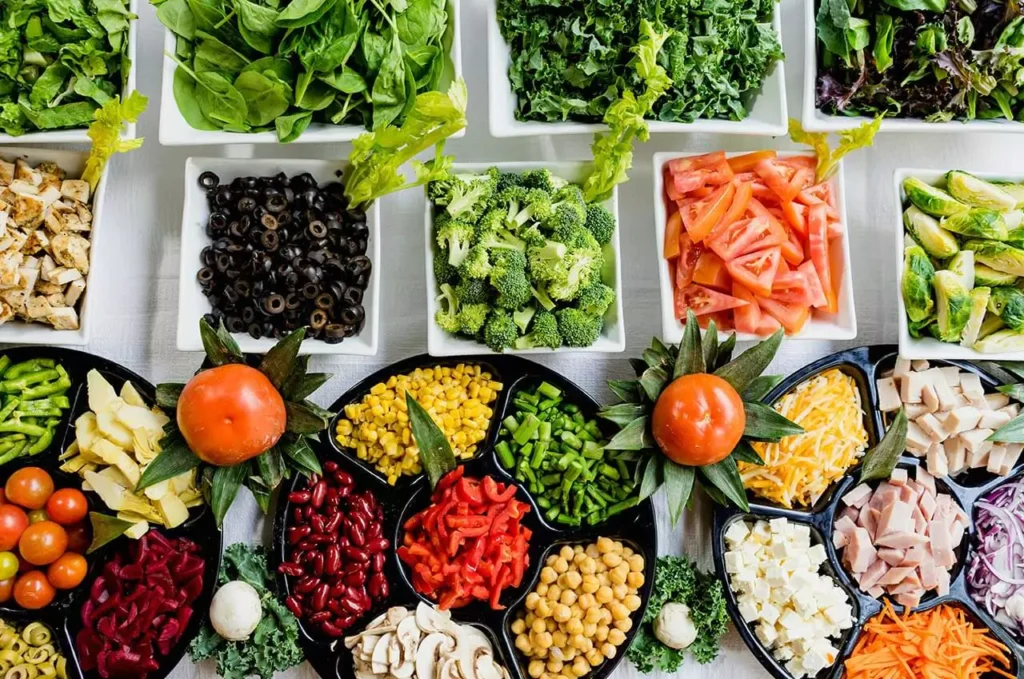Are you also thinking about improving your brain health, then in this blog post we will give you complete information. In this blog post, we are going to tell you about Eating Habits for Greater Brain Health which can be beneficial for your brain health.

Table of Contents
Introduction
In the hustle and bustle of daily life, it’s easy to overlook the impact our eating habits have on our cognitive health. Just as we fuel our bodies for physical health, a conscious approach to nutrition is important for maintaining optimal brain functioning. Let’s learn about the best eating habits that can significantly boost your brain health.
10 Eating Habits for Greater Brain Health

1. Omega-3 Fatty Acids: The Brain’s Best Friend
Omega-3 fatty acids, found in abundance in salmon, walnuts, flaxseeds and chia seeds, act as powerful allies for your brain health. These essential nutrients play a vital role in building and repairing brain cells, promoting optimal brain function, and even reducing the risk of cognitive decline.
Including these delicious and nutritious sources in your diet not only adds variety but also contributes significantly to maintaining cognitive acuity. So, the next time you’re planning your meals, consider adding plenty of omega-3s to maintain your brain health. It is a delicious and beneficial option for a brighter and more focused mind.
2. Vibrant Vegetables: A Colorful Range of Brain Benefits
Colorful vegetables like spinach, kale and bell peppers not only look attractive, but they’re a powerhouse for your brain. Packed with essential nutrients, these vibrant vegetables provide antioxidants, vitamins and minerals important for cognitive health.
Spinach and kale, rich in folate and antioxidants, support memory function, while bell peppers contribute to improving mood with their high vitamin C content. Make your plate a canvas of colors, knowing that each color brings unique benefits to your brain.
3. Berries: Small But Mighty Brain Booster
Berries like blueberries and strawberries aren’t just delicious treats, they’re little powerhouses of goodness for your brain. Rich in antioxidants, these colorful gems play a vital role in protecting your brain from oxidative stress, supporting cognitive function, and potentially preventing age-related decline.
Adding a handful of berries to your breakfast or enjoying them as a snack can be a delightful way to boost your brain health. So, the next time you taste those sweet, juicy berries, know that you’re not only enjoying their taste, but also giving your brain a boost of nutritional goodness.
4. Whole Grains: Lasting Energy for Mental Agility
Consuming whole grains like brown rice, quinoa, and oats gives your brain sustained energy throughout the day. Unprocessed and rich in fiber, these grains help control blood sugar levels, keeping your focus sharp and concentration steady. Imagine starting your day with a hot bowl of oatmeal.
Not only is it a comforting breakfast, but it also sets the tone for continued cognitive function. Making simple changes, such as choosing whole grain bread instead of refined options, contributes to a healthy brain, which supports your overall well-being and cognitive performance in the long run.
5. Nuts and Seeds: Little Packages of Brain Boosting Nutrients
Nuts and seeds provide a delightful crunch while providing a powerhouse of nutrients to support your brain. Almonds, walnuts, pumpkin seeds and sunflower seeds aren’t just snacks. They are nutrient-rich support for cognitive well-being. Almonds, rich in vitamin E, contribute to memory enhancement, while walnuts bring omega-3 fatty acids, which are essential for brain health.
Eat pumpkin and sunflower seeds for magnesium, which aids learning and memory. Adding these nutritious dishes to your daily routine not only satisfies your taste buds, but it also nourishes your mind, promoting sustained focus and mental clarity throughout the day.
6. Lean Protein: Building Blocks for a Sharp Brain
Choosing lean proteins is a smart move for your brain and body. Choosing sources like chicken, turkey, fish or plant-based options like lentils and tofu provide essential amino acids without added saturated fat. These proteins support neurotransmitter function, aiding in better mood regulation and cognitive performance.
Additionally, lean protein contributes to stable energy levels, helping you stay focused throughout the day. Including these options in your diet not only improves your brain health but also ensures a delicious and satisfying culinary experience. Embrace the goodness of lean protein and enjoy the benefits for your overall health.
7. Hydration: Water for cognitive clarity
Hydration is your brain’s best ally. Just as a plant needs water to grow, your brain also needs water to function optimally. Dehydration can adversely affect your memory and cognitive abilities. Make a habit of drinking water throughout the day to ensure that your brain remains well hydrated.
Don’t underestimate the impact of this simple practice. It’s not just about quenching your thirst. It is about increasing your brain power. So, keep a bottle of water handy, squeeze some lemon in it for added freshness and take your hydrated brain towards better focus and cognitive well-being.
8. Turmeric: Golden spice, golden mind
Turmeric, the golden spice known for its vibrant flavor, does more than add flavor to your dishes. it contributes to your brain health. Turmeric root contains curcumin, a powerful compound renowned for its anti-inflammatory and antioxidant abilities. By adding turmeric to your food you are not only enhancing the taste but also promoting cognitive health.
Studies show that curcumin can increase levels of brain-derived neurotrophic factor (BDNF), a growth hormone essential for brain function.
Also Read: 10 Japanese Techniques to Overcome Laziness
9. Dark Chocolate: Packed with Cognitive Benefits
You can make your taste buds impeccable by including dark chocolate in your daily diet. In addition to its great taste, dark chocolate has incredible benefits for your brain. Rich in flavonoids, it has powerful antioxidant and anti-inflammatory properties. Moderation in consumption may enhance memory and cognitive function.
Choose dark chocolate with at least 70% cocoa content to enjoy its full benefits. So, enjoy the richness, knowing that you are not only treating yourself but also nourishing your cognitive well-being with each delightful meal.
10. Mindful Eating: A Holistic Approach to Brain Health
Adopt the practice of mindful eating to create a deeper connection with your food. This involves savoring each piece, paying attention to flavor and texture, and being present in the moment. By slowing down and appreciating your food, you not only enhance the overall dining experience, but also promote better digestion and increase awareness of your body’s hunger and fullness signals.
Mindful eating encourages a healthy relationship with food, helping you make conscious choices that contribute to both physical and mental well-being. Take some time to truly enjoy your food, nourishing not only your body but your mind as well.
What are the 5 Worst Foods for Memory

Certain foods can have negative effects on memory and cognitive function. Here are five types of foods often considered the worst for memory
1. Highly Processed Foods
Foods rich in refined sugars and unhealthy fats, such as processed snacks and fast food, can contribute to inflammation and oxidative stress in the brain, potentially leading to memory loss.
2. Trans Fat
Trans fats, found in many commercially baked and fried products, have been linked to cognitive decline. They can contribute to inflammation and hinder the proper functioning of brain cells.
3. Drinks High in Sugar
Sugary beverages, including soda and energy drinks, can cause memory problems. High sugar intake is linked to insulin resistance, which can affect the brain’s ability to process information.
4. Excessive Alcohol
Heavy alcohol consumption over time can damage the brain and impair memory function. This can lead to conditions such as Wernicke Korsakoff syndrome, which is characterized by severe memory loss.
5. Sodium Rich Foods
A diet rich in sodium, often found in processed and pre-packaged foods, can have negative effects on cognitive function. High sodium levels can increase blood pressure, which is associated with a higher risk of cognitive decline.
Although occasional consumption of these foods may not have any significant effect, incorporating them into a regular diet may lead to long-term cognitive problems. Prioritizing a balanced diet rich in brain-boosting nutrients is essential for optimal cognitive health.
Conclusion
Adopting these brain-boosting eating habits can have a profound impact on your cognitive health. From savoring omega-3-rich salmon to enjoying the antioxidant-packed sweetness of berries, each choice is a step toward a more vibrant mind. Whole grains provide sustained energy, while the creamy goodness of avocado supports optimal brain function.
Dark chocolate becomes a guilt-free indulgence, and the golden spice turmeric adds a delicious flavor of cognitive well-being. With the calming ritual of green tea and the simplicity of staying hydrated, these habits aren’t just diet choices. They are your mind’s path to a brighter, more nurturing future.
We hope that we have managed to answer the question “Eating Habits for Greater Brain Health” in this blog post. Do you enjoy reading blog posts then we are sure you will be a fan of our next blog post. Please share it with your friends and family also.
FAQ Frequently Asked Questions
Q1. What food is bad for memory?
Ans: Excessive consumption of highly processed foods, trans fats found in baked goods, and sugary drinks are known to be harmful to memory. Additionally, heavy alcohol consumption and a diet rich in sodium-rich processed foods can have a negative impact on cognitive function.
Q2. Is rice good for the brain?
Ans: Yes, rice is a good source of carbohydrates, which provide essential energy to the brain. Additionally, it contains nutrients such as vitamins and minerals that support overall cognitive function. Choosing whole grain varieties may provide additional benefits due to their high fiber and nutrient content.
Q3. Do bananas help memory?
Ans: Yes, banana can help in improving memory. They contain nutrients like potassium and vitamin B6, which are essential for brain health and neurotransmitter function, which contribute to improved cognitive function and memory. Adding bananas to your diet as a nutritious snack can be beneficial for overall brain health.